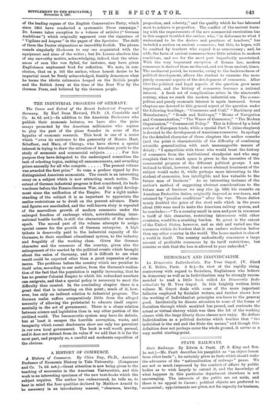THE INDUSTRIAL PROGRESS OF GERMANY.
The Cause and Extent of the Recent Industrial Progress of Germany. By Earl Dean Howard, Ph.D. (A. Constable and Co. 4s. 6d. net.)—In addition to the American Professors who publish their economic lectures, we have also the prize essays promoted by the American millionaire who aspires to play the part of the pious founder in some of the bypaths of economic research. This book is one of a series which "owes its existence to the generosity of Messrs. Hart, Schaffner, and Marx, of Chicago, who have shown a special interest in trying to draw the attention of Amarican youth to the study of economic and commercial subjects For this purpose they have delegated to the undersigned committee the task of selecting topics, making all announcements, and awarding prizes annually for all who compete The present volume was awarded the first prize." So runs a preface signed by five distinguished American economists. The result is an interesting essay on a subject which is now attracting much notice. The extent of German industrial progress is first considered, its back- wardness before the Franco-German War, and its rapid develop- ment since the unification of the Empire. For a right under- standing of the subject it is as important to appreciate the earlier restrictions as to dwell on the present advance. Facts and figures are marshalled, and the well-known story is repeated of the marvellous growth of modern commerce under the enlarged freedom of exchange which, notwithstanding inter- national hostile tariffs, is still the characteristic of the modern epoch. The second part of the volume attempts to assign special causes for the growth of German enterprise. A high tribute is deservedly paid to the industrial capacity of the Germans, to their excellent educational system, to the industry and frugality of the working class. Given the German character and the resources of the country, given also the enlargement of the market by the political events which brought about the union of Germany, and it is difficult to see what result could be expected other than a great expansion of com- merce. The problems before the country which are peculiar to itself arise, according to our author, from the German's realisa- tion of the fact that the population is rapidly increasing, that he has no greater Colonial Empire to which his redundant numbers can emigrate, and that a special policy is necessary to meet the difficulty thus created. In the concluding chapter there is a great deal that is interesting on this point ; much of it, how- ever, has only an indirect relation to industrial progress. The German realm suffers comparatively little from the alleged necessity of allowing the proletariat to educate itself experi- mentally in the art of government. There is a closer relation between science and legislation than in any other portion of the civilised world. The bureaucratic system may have its defects, but at least it escapes the horrible corruption, waste, and incapacity which recent disclosures show are only too prevalent in our own local government. The book is well worth perusal, and it does not detract from its value if we add that it is for the most part, and properly so, a careful and moderate exposition of the obvious.






























































 Previous page
Previous page